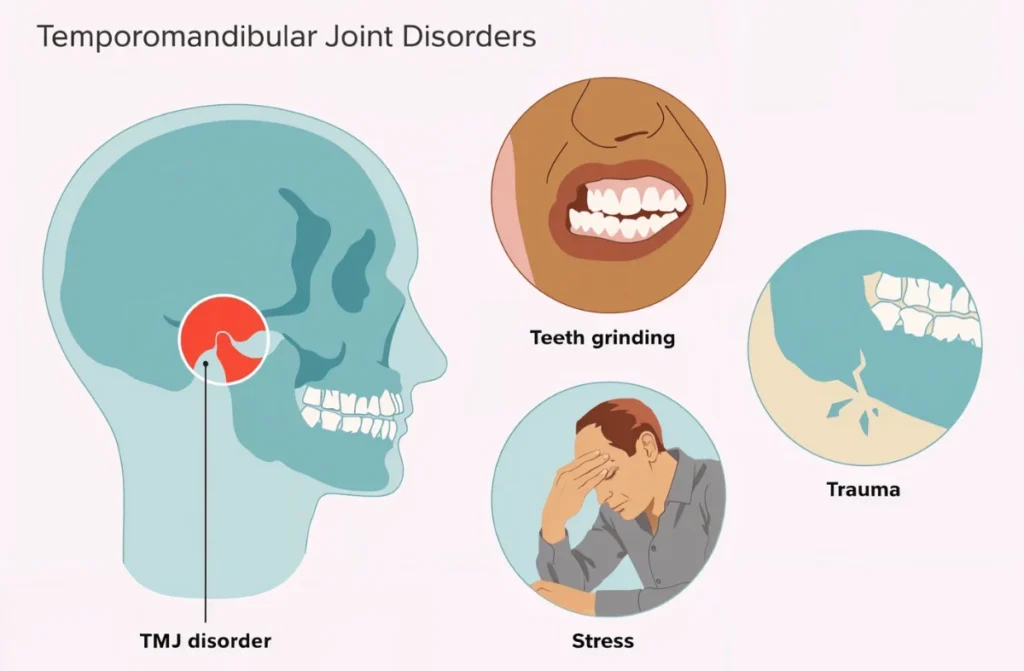Temporomandibular disorders (TMD) affect the jaw joint and surrounding muscles, causing pain, restricted movement, and discomfort. As one of the most common musculoskeletal conditions affecting the jaw, Temporomandibular Disorder in Chennai can significantly impact daily activities such as chewing, speaking, and yawning. Studies suggest that over 10 million people suffer from TMD, with symptoms varying from mild discomfort to severe chronic pain. Early diagnosis and specialized treatment are crucial in preventing long-term complications and improving the quality of life.

Common Characteristics of Temporomandibular Disorder in Chennai
- Jaw pain or tenderness
- Clicking or popping sounds in the jaw
- Difficulty chewing or biting
- Locking of the jaw joint
- Facial swelling and discomfort
- Ear pain or ringing (tinnitus)
- Limited range of jaw motion
- Persistent discomfort that worsens with jaw movement
- Increased sensitivity around the jaw and ear region
- Pain that radiates to the temples or cheeks
What Are Risk Factors for TMJ Syndrome?
Certain factors increase the risk of developing Temporomandibular Disorder in Chennai:
- Age: Most common among individuals between 20-40 years old.
- Gender: Women are more likely to develop TMD than men.
- Jaw Trauma: Accidents or injuries affecting the jaw joint.
- Genetics: Family history of TMD or arthritis.
- Teeth Grinding: Habitual clenching or grinding of teeth.
- Poor Posture: Bad posture can contribute to muscle tension affecting the jaw.
- Stress Levels: Chronic stress can lead to increased jaw tension and clenching.
- Tmd Treatment In Nungambakkam: Accessing specialized care in this area may help reduce risk factors and provide timely intervention.
- Chronic Pain Conditions: Conditions like fibromyalgia may be associated with increased TMD risk.
- Repetitive Jaw Movements: Constant gum chewing, nail biting, or jaw clenching.
- Excessive Dental Work: Frequent procedures may contribute to jaw strain.
- Autoimmune Diseases: Conditions like lupus and rheumatoid arthritis affecting joints.
Common Causes of Temporomandibular Disorder (TMD)
The exact cause of Temporomandibular Disorder in Chennai varies from person to person. Several factors may contribute to the development of TMD:
- Injury: Trauma to the jaw or head can damage the TMJ.
- Teeth grinding (bruxism): Excessive grinding or clenching can strain the jaw muscles.
- Arthritis: Osteoarthritis or rheumatoid arthritis can affect the TMJ.
- Stress: High levels of stress may lead to jaw clenching, worsening TMD symptoms.
- Misalignment: An uneven bite or misaligned jaw can put pressure on the joint.
- Hormonal Factors: Studies suggest that hormones, especially in women, may play a role in TMD.
- Poor Posture: Slouching can strain neck and jaw muscles, leading to TMD.
- Genetics: A family history of jaw disorders or arthritis may increase the risk.
- Excessive Gum Chewing: Overuse of jaw muscles can lead to strain and discomfort.
Symptoms of Temporomandibular Disorder (TMD)
The symptoms of Temporomandibular Disorder in Chennai can range from mild discomfort to severe pain and restricted movement. Common symptoms include:
- Persistent pain or tenderness in the jaw area
- Clicking, popping, or grating sounds when moving the jaw
- Difficulty opening or closing the mouth completely
- Facial pain that radiates to the ear or neck
- Frequent headaches or migraines
- Swelling around the jaw area
- A sensation of the jaw getting locked
- Difficulty chewing or discomfort while eating
- Shoulder and neck pain due to prolonged strain
- Jaw stiffness that worsens in the morning
- Sensitivity or discomfort when speaking for long periods
- Increased pain during cold weather or stress-related episodes
Treatment Options for Temporomandibular Disorder (TMD)
Several treatment options are available to manage Temporomandibular Disorder in Chennai effectively. The right treatment depends on the severity of the condition and the underlying cause.
Non-Surgical Treatments
- Medication: Pain relievers and muscle relaxants help reduce discomfort.
- Physical Therapy: Exercises improve jaw movement and strengthen muscles.
- Occlusal Splints: Mouthguards prevent teeth grinding and reduce stress on the TMJ.
- Hot and Cold Therapy: Ice packs reduce swelling, while heat relieves stiffness.
- Lifestyle Changes: Avoiding hard foods and chewing gum can help minimize strain on the jaw.
- Tmd Treatment In Nungambakkam: Specialized treatment options are available in this locality, ensuring expert care for patients.
- Relaxation Techniques: Practicing mindfulness and stress management can reduce jaw tension.
- Diet Modifications: Consuming soft foods and avoiding excessive jaw movement can provide relief.
- Acupuncture: Alternative therapy to relieve muscle tension and pain.
- Chiropractic Care: Adjustments may improve TMJ function and reduce discomfort.
- Ultrasound Therapy: Helps alleviate pain by promoting deep tissue healing.
Surgical Treatments
- Arthrocentesis: A minimally invasive procedure to remove debris from the joint.
- Arthroscopy: A surgical procedure using small instruments to correct joint issues.
- Open-Joint Surgery: Required for severe cases where other treatments have failed.
- TMJ Implants: Artificial joint replacements in extreme cases.
- Joint Reshaping: Surgical intervention to modify the jawbone and improve function
Conclusion
Temporomandibular Disorder (TMD) is a condition that requires proper diagnosis and treatment. Identifying the causes and symptoms early can help in effective management. Various non-surgical and surgical treatments, including Top TMJ Disorder Treatments in Chennai, are available to relieve discomfort and restore normal jaw function. Consulting a specialist is crucial in determining the best approach to treatment, especially for TMD Treatment in Nungambakkam. With the rising Prevalence of Temporomandibular Disorders in Chennai, awareness and timely intervention can significantly improve the quality of life for affected individuals. Proper medical guidance and self-care strategies can make a significant difference in managing TMD symptoms and preventing further complications.





